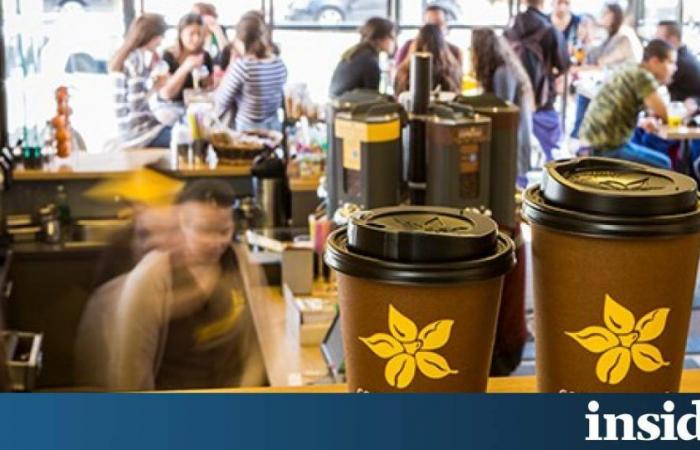
News “green” breath Coffee Island is trying to give, as it intends to invest 3-5% of its non-systemic turnover in sustainable development, as revealed by the company’s management at an event on the topic of the Sustainable Development Strategy, while joining forces with the company Coffee-Eco.
O CEO of Coffee Island, Konstantinos Konstantinopoulos estimated that the first quarter of 2023 was quite good in terms of purchases and the effort made by the company was “embraced” by the world. He underlined that Coffee Island has shown seriousness and resilience, which has been recognized and estimates that the non-systemic turnover of the business will reach 36 million euros, with 3%-5% invested in sustainable development. Referring to the part of organized retail, he said that in 2023 it will reach 7% of the company’s turnover with the prospect of increasing gradually in the coming years.
“For us, sustainable development is linked to a holistic approach to the way we do business. Our goal is to become a pillar of development for local societies,” he explained, adding that the gap between the countries that produce and those that consume the coffee drink is huge.
35% of the global coffee market in 10 “hands”
During the event, Mr. Konstantinopoulos noted that there are things that contribute to sustainable development “but without a shot.” “We were never able in the first years of the effort to evaluate whether we are doing it right” he found and added that in mid-2019 “we said that this must stop and reduce sustainable development as a key priority of our strategy with measurable indicators”.
“Key pillars of our sustainable development strategy are people, the planet and the product itself. We have seen best practices, we have been greatly influenced by consumer trends that have changed significantly and have to do with both lifestyle philosophy and technology. It has significantly changed how people perceive the concept of sustainable development” he clarified and revealed how 35% of the global coffee market is managed by 10 companies in the world. “It is a very concentrated industry in large and dominant players in the global market and all other players have little ability to change the situation. We have to change the way we operate, otherwise we make a hole in the water,” he explained.
“We have no room for half measures, we have to maximize and surpass ourselves. We don’t want to promise something we can’t deliver,” he explained, adding that the situation with the environment is critical and serious and radical changes are needed to reverse the difficult landscape that has formed.
With a special mention in the section “Creating Value in the Greek Economy”, he presented some interesting numbers:
- The estimated systemic turnover (company turnover + stores) for 2022 amounted to 155 million euros
- 11.1 million euros systemic investments from 2021 -2024 systemic
- 432 small businesses (franchises) (+55 stores abroad)
- 235 stores stores in the Greek region (55%) – 102 cities
- Support for 4,000 families (directly and indirectly, such as barista, delivery, maternal)
- 817 Greek supplier companies
At the same time, he described 2022 as a nervous year, with the eight months not being particularly strong, but then, with a lot of action and work, “we closed the year at around the numbers of 2021. In 2022, both consumption and turnover were at the levels of 2021 he stated.
At the mercy of the pandemic and inflation, the company on November 17, 2021 made a first increase in coffee prices with the next increase taking place after Easter. “Throughout 2022 with a single price list, if we exclude food, we have absorbed 100% of the price increases in coffee” such as shocks in the euro-dollar exchange rate, problems during the production-harvest process, fluctuations in the market value of the product, but also transportation costs. “On a general level, along with food, we absorbed 80% of the revaluations. In 2022, we had approximately 3,427 product price increases from the suppliers,” emphasized Mr. Konstantinopoulos.
“The region is important, we also want to be in small towns and villages. We are the largest chain in Greece without being the largest chain in all cities. You won’t see signs of cannibalism or over-concentration of points, on the contrary of the size” he said, while pointing out that “Cofee Island has chosen to have its headquarters in Greece and we face a competition with foreign brands” that have a more favorable context. He described Greek companies as competitors, declaring that “you have to overcome many problems” to compete with the large foreign companies that have dominated the market. According to him, Mr excise tax on coffee “it doesn’t exist anywhere in the world” and it is strongly anti-development, with the Greek companies that have it facing them facing a big disadvantage.
The deal with Coffee-Eco
Coffee Island’s “green” collaboration with Coffe-Eco will lead to its creation first industrial plant in S. Europe that processes and reuses leftover espresso coffee, for the preparation of new products. THE Coffee-Eco expects to complete the processing of 50 tons of coffee residues from the Coffee Island coffee mills, which are intended for the production of raw materials for cosmetics, bioplastics and more, during its first year of operation (coffee residues in Greece annually reach 40,000 tons). In terms of planning, the new industrial unit for the processing and utilization of coffee residues at the Industrial Estate of Patras is also to go ahead. Also, in the plans of the 2 companies, the inclusion of new scientists in the potential of Coffe-Eco and the development of innovative products with the simultaneous “opening” of the sales network of the new products are included.
“The circular economy is a model that we believe will be adopted by all coffee companies in the coming years” emphasized Alexis Pantziaros, Managing Director of Coffeeco. In 2016, Coffe-Eco started research on coffee residues in collaboration with the chemical engineering school of the University of Patras, while 3 years later it finalized its first product for the cosmetics market. In 2022, it won the international V-Label competition and this year it is developing products with the largest Greek cosmetics companies, such as Apivita, KORRES, Dust and Cream and Frezyderm, while also launching her own brand “auraskin.gr”. Its objectives are to increase the economic value per kilogram of raw material, to zero organic coffee residue in the production value chain and to reduce the CO2 footprint throughout the espresso coffee production value chain. Finally, it is worth noting that Coffee Island announced that it received the certification Bio Organic EUROCERT for the production of organic coffee in the privately owned coffee processing and storage facilities it maintains in Patras.
The collaboration with Nisos and the “marriage” of beer and coffee
As already written insider.Grin July 2022 the companies Nisos and Coffee Island proceeded to collaborate and launched the innovative product on the market Coffee Cold Brew Beer. It is a product that “is getting married» elaborately the flavors of beer and iced coffee and is an alternative choice “for the company” in the afternoon hours, with the aim of “change of taste palette” of the consumers.
Since its launch in July, the product has been available exclusively through Coffee Island stores, but the aim is to place it in more points of sale in the near future. THE Coffee Cold Brew Beer combines the characteristics of an aromatic iced coffee and an artisanal, dark porter-style beer. The new product “carries” aromas of coffee, chocolate and fruit, has a low caffeine content and low bitterness, yet has a rich foam, natural carbonation and 5% alcohol from fermentation.
A “breath” from the 500 stores
It is worth noting that Coffee Island, which is a leading player in the coffee industry in Greece and Southern Europe, started in 1999 from Patras, where it maintains its headquarters until today. Its network includes more than 489 coffee roasters with 432 based in Greece. However, it also has stores under its own brand abroad, with 49 of its coffee roasters located in Cyprus, while it has also expanded to the UK, Canada, Switzerland, Romania, Dubai, the United Arab Emirates and Egypt. In 2018 it was ranked as the 6th largest coffee chain in Europe, while a year later, the Financial Times included it among the 1,000 fastest growing businesses of the “Old Continent”.
It has its own coffee processing and storage facilities in Patras, where 1,400 tons of coffee are processed and roasted per year to exclusively cover the needs of its network. It supports direct cooperation with individual producers, or cooperatives, in coffee-producing countries, making direct trade a pillar of its corporate culture and action, with 90% of coffee imported directly from the farms. Based on the data of 2022, Coffee Island employs 215 workers, cooperates with 513 entrepreneurs through a franchise system, while its network employs over 3,500 trained baristas and distributors. The company is in its third decade of success.
Tags: Coffee Island Big investment sustainable development Absorbed coffee appreciation
-




